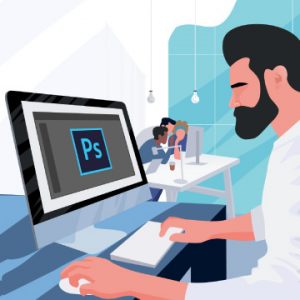You are going to get ‘blurry’ text if you downsample to 72 ppi from a scan.
Why don’t you send your visitors to the magazine publisher’s site instead of violating their copyright?
we’re not sending it to anyone, and it’s a free magazine regardless… calm down.
If you are not sending it to anyone, then why worry about file size? Keep your scans at 200+ ppi.
because we’re trying to create an archive and don’t want it to be monstrous. i’ll try 200. thanks.
Whether or not it’s free has no bearing on the fact that it is a copyrighted work. The general rule of copyright is, if you didn’t make it, it’s not yours to copy.
Whether or not it’s free has no bearing on the fact that it is a copyrighted work
But it has a big bearing on what constitutes fair use of the copyrighted work.
<
http://en.wikipedia.org/wiki/Fair_use>
okay i just needed some help. i’m not sure exactly why you felt the need to seek this thread out and assume things about my post and respond with common knowledge, but it’s not constructive. you really have no idea what material i’m using or what i’m using it for or if i have permission. so kindly mind your own business unless you know the answer to my question.
kholl:
This is a forum of media creators. When you write in saying you are scanning media, prepare to be quizzed about the copyright. It happens every time. That should be common knowledge. It’s also common knowledge that 72 ppi will not hold type well, hence your blurriness problem. Higher resolution, with lower quality JPG compression, will result in a better file, when considering quality vs file size. Try using the bicubic sharper algorithm when sizing your scans down.
You might also try selecting the white paper/ black text areas and making sure they are as sharp as possible, by forcing the black text to 0,0,0 using levels, and the white paper to 255,255,255. Making the paper white is a move that will probably be better applied to the whole scan.
J
I think some of us questioned your concept of copyright because there was clear misunderstanding of resolution, which is ‘common knowledge’ here. We cannot easily assess what knowledge you hold. Forgive us all for trying to be helpful.
Being in a forum, it is certainly constructive to discuss issues of scanning magazines, even if you do not feel it applies directly to you. If you wanted a personal correspondence without offering the topic to open discussion, you should not have posted in a forum.
EDIT: yeah… what J said.
Yes, if it’s only type, 1-bit GIF will be much better than JPG. I kind of assumed that 5 pages from a magazine had something of more interest than just type.
Ideally, you’d assemble two scans (1-bit for type, jpg for images) in IND and export to PDF from there. It’s a little more work, but particularly when printing from the PDF, you get a small file that outputs very close to the original.
fair enough. i just felt like what and why i was scanning was sort of beside the point. i don’t know as much about photoshop as others, obviously, or i wouldn’t be seeking help on this forum.
anyway sorry for being a jerk. i have been working on this stuff all day and have the frustration disease. i appreciate your help and will be publishing your responses on my website soon.
kholl,
anyway sorry for being a jerk.
You’re not being a jerk if something has been learned from the thread.
i appreciate your help and will be publishing your responses on my website soon.
Now, speaking about copyrighted content…
<g>
Neil
I have a technique that might help you. I have a customer that needs 2-4 page PDFs accessed via the web, so they need to be as small as possible. The original files are full color CMYK Illustrator EPS files with photos, logos and text. But, this may help you with your scans. I Export out of Illustrator as 150ppi RGB .tiff’s each page. Then, I open the .tiff’s in Photoshop and save them as Photoshop .pdf’s. Finally, I reassemble the multi-page document in Acrobat and save it as a .pdf; final 2-4pg = 300k +/-.
If its just a scan and there is no vector shapes or type what is the point of saving as a PDF?
John, if you have Acrobat, you do not need the Photoshop step. Just assemble the TIFF files in Acrobat. Photoshop only introduces further JPG compression if you use the default PDF generation settings.
I’ve tried it via Acrobat, also using Distiller, and "save-As" via Illustrator. For whatever reason, the smallest file size was only achievable ( in my case, anyway ) through my method described. I wanted to help the post’r achieve the smallest size .pdf and thought my method could help. Obviously I started with a vector file. In his case, if he scans @ 200ppi RGB, then opens the file in PS and sizes it down to 150ppi ( in an attempt to retain the sharpness of a medium sized scan, while reducing the overall size of the file; and then saving as Photoshop PDF and reassembling the document pages in Acrobat for a final, multi-page PDF at a reasonable final size.
then saving as Photoshop PDF
What type of Photoshop PDF?
The reason why you are getting the smallest file size from Photoshop is because the default PDF settings in Photoshop use JPEG compression. So there is not much of a point in trying to maintain TIFF files in that workflow when all you end up with is a JPG file packed in a PDF file.
Illustrator can output JPG directly or TIFF (with lossless compression). You can really tinker with compression well if you use Save for Web in Illustrator. Photoshop is just an extra step.

